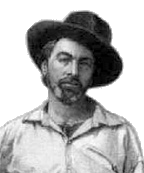May 31: Walt Whitman
Walt Whitman (1819)
It was on this date, May 31, 1819, that American poet Walt Whitman was born in West Hill, New York, the offspring of a working-class family. His father had known and admired Thomas Paine and instilled liberal ideas in Walt, which did not include allegiance to any church. Wrote Whitman:
I believe in the flesh and the appetites,
Seeing, hearing, feeling, are miracles, and each part and tag of me is a miracle. ...
The scent of these arm-pits aroma finer than prayer,
This head more than churches, bibles, and all the creeds.—"Song of Myself"
Whitman's formal education was in Brooklyn's public schools, but his informal education included museums, libraries and the occasional public lecture – including the radical Quaker Elias Hicks, and the Scottish radical women's rights advocate Frances Wright – as well as approaching and talking to everyone. He got his first job in journalism at 12 and in 1842 published a temperance novel called Franklin Evans; or The Inebriate. It was his greatest commercial success, but its pedestrian, formulaic prose shows Whitman searching for a voice.
He found and founded a distinctly American voice in Leaves of Grass, published in 1855.* In this master work, as in all his poetry, Whitman has little use for conventional religion: "Pointing to another world will never stop vice among us," he wrote, "shedding light over this world can alone help us."
And I say to mankind, Be not curious about God,
For I who am curious about each am not curious about God, ...
I hear and behold God in every object, yet understand God not in the least, ...
I see something of God each hour of the twenty-four, and each moment then,
In the faces of men and women I see God, and in my own face in the glass,—"Song of Myself"
Instead, Whitman celebrated secular values and especially praised the human body in such poems as "Song of Myself":
Behold, the body includes and is the meaning,
the main concern and includes and is the soul;
Whoever you are, how superb
and how divine is your body, or any part of it!—"Song of Myself"
In fact, Whitman was so unabashed a body-worshiper that Leaves of Grass was banned in Boston, expurgated in England, and cost him a government job at the hands of Methodist ex-cleric and political appointee James Harlan of Iowa.
His friends rallied to him, based on his years of selfless volunteer nursing efforts during and after the Civil War, and Whitman was soon employed again. His Civil War selflessness eventually cost him his health: first Whitman had to retire from government due to exhaustion; then, on January 23, 1873, he suffered a stroke and never regained full health. Still, Whitman was unalterably positive about his American nation and expressed a childlike faith in scientific and technical progress:
Science, testing absolutely all thoughts, all works, has already burst well upon the world – a sun, mounting, most illuminating, most glorious, surely never again to set. But against it, deeply entrench'd, holding possession, yet remains (not only through the churches and schools, but by imaginative literature, and unregenerate poetry) the fossil theology of the mythic-materialistic, superstitious, untaught and credulous fable-loving, primitive ages of humanity.
Walt Whitman died on 26 March 1892, at his home in Camden, New Jersey, age 72. His poetry lives in the canon of great American literature.
*Ralph Waldo Emerson said Leaves of Grass contained "incomparable things incomparably said."
Originally published May 2003 by Ronald Bruce Meyer.


